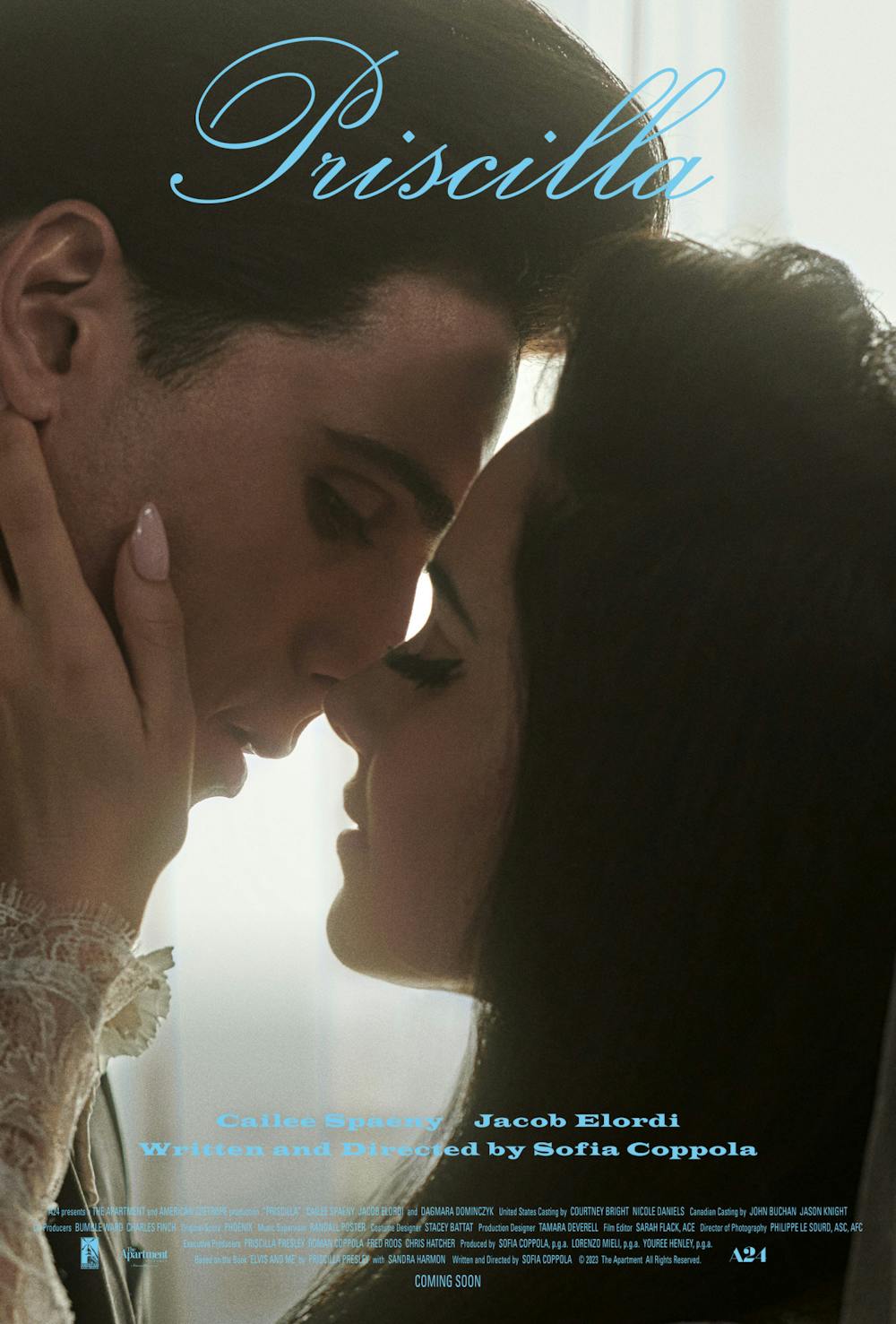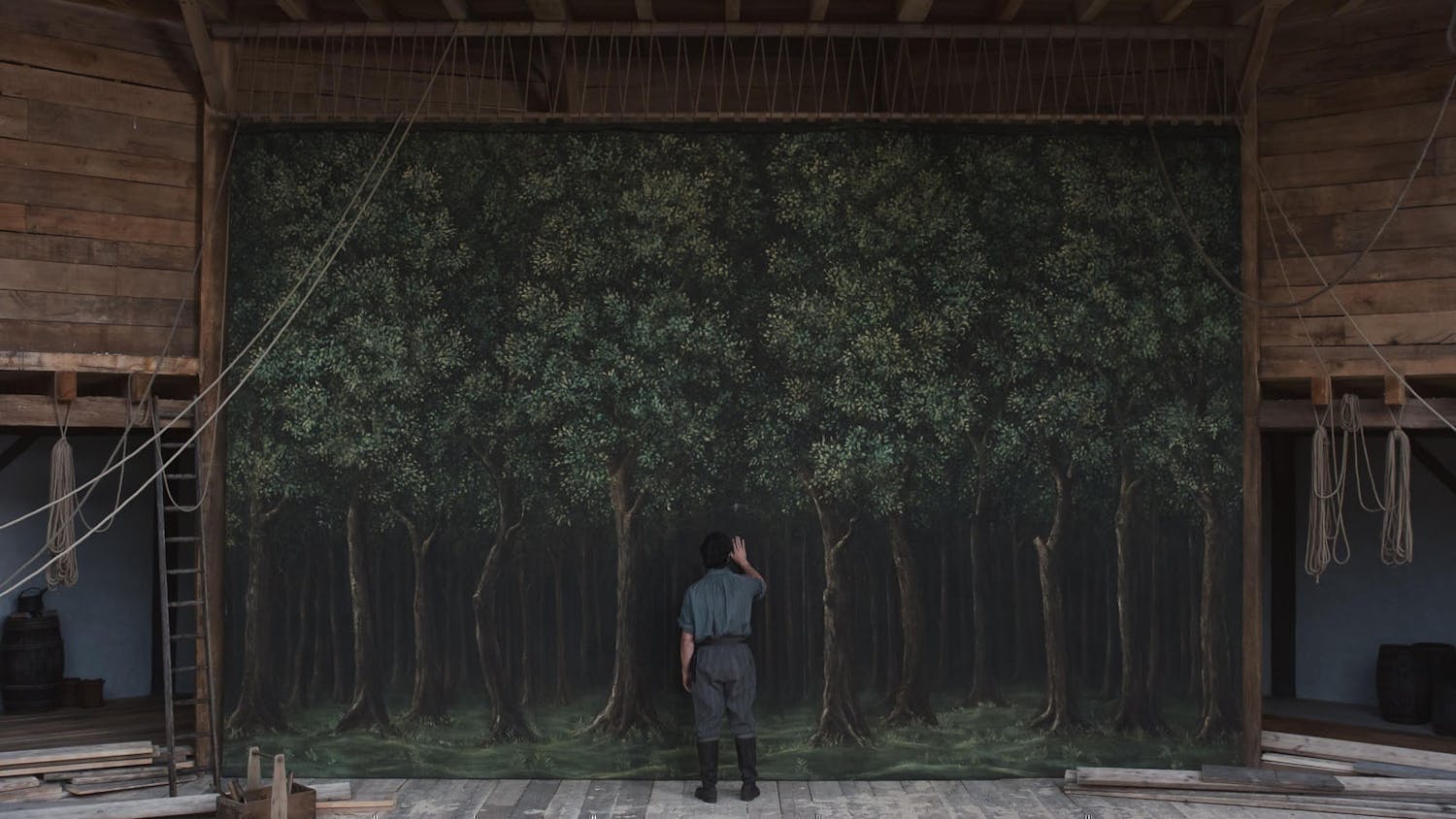In the background, men are blubbering and scrambling to confirm plans for her hospital transportation. Meanwhile, laboring first-time mother Priscilla is serene at her vanity, carefully placing false eyelashes on her waterline.
Sardonic, yet socially potent moments like this define A24’s “Priscilla.” This highly-anticipated film is, at its core, biographical. Based on Priscilla Presley’s 1985 memoir “Elvis and Me,” the film chronicles her relationship with the infamous rock-and-roll sex symbol.
The movie was written, directed and co-produced by Sofia Coppola, with the real Priscilla serving as executive producer. Coppola is an actress and Academy Award winning filmmaker best known for “The Virgin Suicides” (1999), “Lost in Translation” (2003) and “Marie Antoinette” (2006). Her movies bring a feminist lens to the complexities of girlhood and womanhood. Fans cherish her charming focus on beautiful mundanity and overarching themes of loneliness, youth and femininity.
Yet “Priscilla” is not the glamorous, wholly aesthetically pleasing, fluff-piece vignette of the ‘60s and ‘70s that many anticipated. Instead, it properly plays homage to Priscilla’s hardships, thus those of the era’s women at large.
The film begins in 1959 with the couple’s introduction while Priscilla’s family is living on a military base in Germany. Cailee Spaeny — who plays Priscilla — manages to operate in an ambiguous void between a 14-year-old girl and a 27-year-old woman.
Spaeny offers a poignant performance of the doe-eyed school-girl who gradually gains more agency in opposition to Elvis’s overbearance. The audience watches in rapt discomfort as she transforms from the passive, perpetually meek girl to a strong woman who finally believes she deserves more than her partner’s mistreatment. She stops listening to lies about how lucky she is to be the arm candy of the most sought-after man on the planet.
Scenes that show the glamor and party scene of the period are few and far between. The film mainly consists of sultry, quiet moments where Priscilla waits isolated and friendless for Elvis to return. She passes the time wading through high school drudgery or keeping up with his newest affair allegations through tabloids.
When they are together, Elvis controls Priscilla through emotional manipulation and their mutual drug abuse. The film features many hand shots, most of which are Jacob Elordi’s gargantuan fingers placing pills in Spaeney’s delicate palms.
Elordi’s Elvis Presley is subtly charming, a seemingly gentle giant: he’s six-foot-five to Spaeny’s five-foot-one. He is humble and peaceful until he’s not, and this clever slow talking combined with his good looks forces the audience to understand why Priscilla is so enraptured.
Nevertheless, this is Priscilla’s time to share her story. Elvis is seldom shown performing, and when he is, his joy and success are shared with his sweetheart.
A scene that perfectly portrays their relationship dynamic and the tone of the film as a whole occurs during the couple’s playful photoshoot on their California King. The click of the Polaroid camera combined with Priscilla’s girlish lingerie crafts a time capsule of sweet intimacy.
This portrait shatters when a pillow fight quickly turns abusive; Elvis is emasculated by Priscilla’s audacity to “act like a man” by play-fighting with him.
“Priscilla,” while largely subdued and mundane, pays proper tribute to an abused woman’s story — and couldn’t have done so without showing Priscilla’s monotonous solitude. Nevertheless, the film still portrays endearing moments between the illustrious couple, as well as pleasing references to a widely romanticized era.
Coppola toes the line between aesthetics and reality, managing to satisfy the viewer while still honoring the woman of the hour and condemning gender roles.
Compellingly, the film ends as Priscilla’s relationship does. She drives away from Graceland once and for all, leaving her husband behind. It looks to be a beginning, where a woman finally belongs solely to herself, if she ever can.
This article was edited by Bailey Hobbs, Patricia McGee and Abigail Pritchard. Copy editing done by Isabelle Kravis and Luna Jinks.





